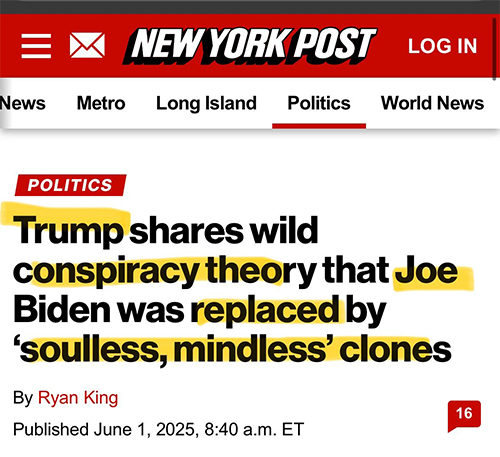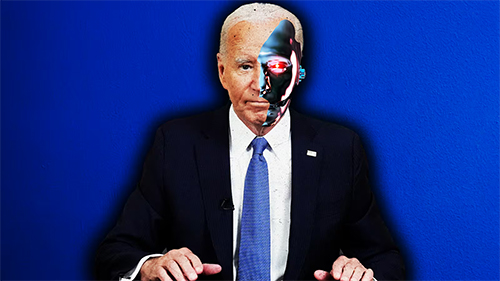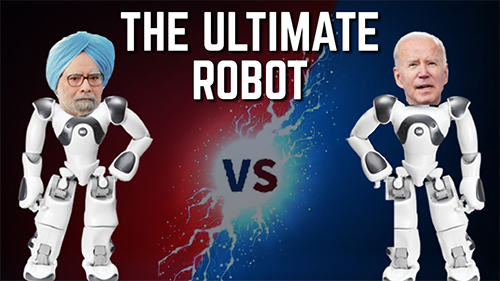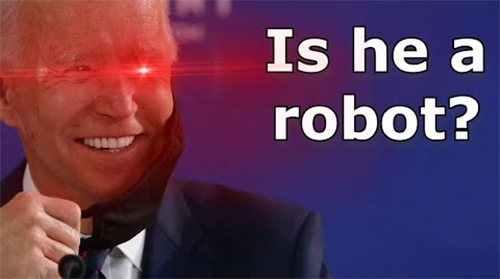by Jordan Rubin
May 29, 2025, 10:28 AM MDT
https://www.msnbc.com/deadline-white-ho ... rcna209677
https://www.courtlistener.com/docket/69775896/dvd-v-us-department-of-homeland-security/
D.V.D. v. U.S. Department of Homeland Security (1:25-cv-10676)
District Court, D. Massachusetts
Last Updated: May 31, 2025, 5:02 a.m.
Assigned To: Brian E. Murphy
https://storage.courtlistener.com/recap ... .132.0.pdf
132. May 23, 2025. Judge Brian E. Murphy: MEMORANDUM AND ORDER ON 104 PLAINTIFFS' MOTION FOR PRELIMINARY INJUNCTION...The Court finds that all four preliminary injunction factors weigh in favor of granting the injunction. Accordingly, Plaintiffs' motion for preliminary injunction is GRANTED. Defendants are hereby ORDERED to take all immediate steps, including coordinating with Plaintiff's counsel, to facilitate the return of O.C.G. to the United States. Defendants shall file a status report within five days of this Order updating the Court as to the status of O.C.G.'s return... (BIB) (Entered: 05/23/2025)
The Trump administration did something interesting: It signaled it’s going to comply with a court order to facilitate a wrongly deported man’s return. While highlighting how low the bar is for this administration, the move is notable for standing in contrast to the government’s resistance in other cases, including in the ongoing saga of Kilmar Abrego Garcia.
This latest case involves a gay Guatemalan man identified in court papers as O.C.G., who, his lawyers said, fled his country to avoid persecution due to his sexual orientation. An immigration judge barred his removal to Guatemala, after which agents sent him to Mexico, even though he had said that he was targeted and raped there.
The government represented to the court that O.C.G. was asked whether he was afraid of being sent to Mexico and said no, but when it came time to prove that, the administration told the court that it actually didn’t have a witness who could back it up.
On Friday, U.S. District Judge Brian Murphy ordered the government to facilitate O.C.G.’s return to the U.S., writing that officials’ “retraction of their prior sworn statement makes inexorable the already-strong conclusion that O.C.G. is likely to succeed in showing that his removal lacked any semblance of due process.” The Biden appointee wrote that O.C.G. is currently in hiding in Guatemala after he was sent back there from Mexico.
In a status report Wednesday, the government said that immigration officials made contact with O.C.G.’s lawyers over the weekend and are working to bring him back to the U.S.
It should go without saying that it’s a good thing for the government to comply with a court order, just as it should go without saying that no congratulations are due for obeying the law, especially when we’re talking about the entity tasked with enforcing the law.
Still, the government’s relatively normal behavior in its latest filing raises the question: Why not return Abrego Garcia (who was illegally deported to El Salvador) or yet another man held in that country (identified in court papers as “Cristian”) whose return another judge ordered the government to facilitate? These other cases are the subject of separate ongoing litigation.
There’s no good justification for failing to right a wrong in any case. But a key difference between O.C.G.’s situation and the others is that the latter are being detained by a foreign government (to be sure, only after the U.S. sent them there in cooperation with that foreign government).
Murphy noted the distinction in his opinion ordering the facilitation of O.C.G.’s return. He wrote, “The Court notes that ‘facilitate’ in this context should carry less baggage than in several other notable cases. O.C.G. is not held by any foreign government.”
Likewise, O.C.G.’s lawyers wrote in support of their facilitation motion, “Notably, ordering DHS to facilitate return in this case does not include the alleged complications involved in Abrego Garcia, where the plaintiff remains detained by a foreign government at the behest of the United States.”
While it’s worth highlighting that Trump administration officials even claim to be working to remedy a wrongful deportation, this latest news seems to stand as more of an aberration than a change in the administration’s legal policy.
In fact, the administration this week launched an emergency Supreme Court appeal in the broader case that Judge Murphy is overseeing, which involves the issue of removing people to so-called third countries where they aren’t from (O.C.G. is a plaintiff in that case). Murphy had intervened in the government’s bid to send migrants to war-torn South Sudan, finding that officials sought to carry out the removals without providing sufficient notice and opportunity to challenge them.
Seeking to upend Murphy’s injunction while those migrants are held at a U.S. military base in Djibouti, the administration wrote to the high court that the judge “usurp[ed] the Executive’s authority over immigration policy” and that his injunction “disrupts sensitive diplomatic, foreign-policy, and national-security efforts.” The plaintiffs’ Supreme Court response is due June 4.
Subscribe to the Deadline: Legal Newsletter for expert analysis on the top legal stories of the week, including updates from the Supreme Court and developments in the Trump administration’s legal cases.
Jordan Rubin is the Deadline: Legal Blog writer. He was a prosecutor for the New York County District Attorney’s Office in Manhattan and is the author of “Bizarro," a book about the secret war on synthetic drugs. Before he joined MSNBC, he was a legal reporter for Bloomberg Law.
************************************
UNITED STATES DISTRICT COURT
DISTRICT OF MASSACHUSETTS
D.V.D, et al.,
Plaintiffs,
v.
U.S. DEPARTMENT OF HOMELAND SECURITY, et al.,
Defendants.
Civil Action No. 25-10676-BEM
MEMORANDUM AND ORDER
ON PLAINTIFFS’ MOTION FOR PRELIMINARY INJUNCTION
MURPHY, J.Plaintiff O.C.G. has no known criminal history. After suffering multiple violent attacks, O.C.G. sought protection in the United States, where an immigration judge granted him withholding of removal from his native country, Guatemala. This means that the immigration judge found it more likely than not that O.C.G. would suffer serious harm if sent back to Guatemala. Two days later, and without any notice, O.C.G. was placed on a bus and sent to Mexico, a country where he was previously held for ransom and raped. O.C.G. had said during his immigration proceedings that he was afraid of being sent to Mexico, and even presented evidence of the violence he had experienced there. But the immigration judge told O.C.G.— consistent with this Court’s understanding of the law—that he could not be removed to a country other than his native Guatemala, at least not without some additional steps in the process. Those necessary steps, and O.C.G.’s pleas for help, were ignored. As a result, O.C.G. was given up to Mexico, which then sent him back to Guatemala, where he remains in hiding today.
This is the second time Plaintiffs have asked this Court to order the return of O.C.G. The first time, the Court declined to do so because the facts were in dispute—Defendants had submitted a declaration, made under oath, that O.C.G., prior to removal, affirmatively stated that he had no fear of being sent to Mexico. Dkt. 31-1 ¶ 3. O.C.G. adamantly contested this fact, submitting his own declaration stating that he was only told about Mexico essentially as it was happening and that he begged to speak to his attorney but was denied. Dkt. 8-4 ¶ 9. Because of this factual disagreement, the Court declined to conclusively credit O.C.G.’s account and instead ordered discovery of additional evidence. Dkt. 64 at 47–48; Dkt. 80.
Last week, on May 16, 2025, Defendants acknowledged an “error” in their previous filings and statements to the Court. Dkt. 103 at 2. Defendants admitted, hours before the scheduled deposition of the witness who could allegedly verify the facts included in the prior declaration made under oath, that, in fact, there was no such witness and therefore no reliable basis for the statements put forward by Defendants. Defendants apparently cannot find a witness to support their claim that O.C.G. ever said that he was unafraid of being sent to Mexico. The only evidence before the Court therefore is O.C.G.’s uncontroverted assertion that he was given no notice of his transfer to Mexico and no opportunity to explain why it would be dangerous to send him there. Defendants’ retraction of their prior sworn statement makes inexorable the already-strong conclusion that O.C.G. is likely to succeed in showing that his removal lacked any semblance of due process, see Dkt. 40 at 6; Dkt. 64 at 42 n.43, and it otherwise alleviates concern about the appropriateness of relief. Accordingly, Plaintiffs’ motion for a preliminary injunction is GRANTED.
Although a preliminary injunction is always an exceptional remedy, never awarded as of right, Peoples Federal Sav. Bank v. People’s United Bank, 672 F.3d 1, 8–9 (1st Cir. 2012), the Court notes that this result is not otherwise so extraordinary. Courts, including district courts, regularly find that return is the appropriate remedy when a removal is found to be unlawful. See, e.g., Grace v. Whitaker, 344 F. Supp. 3d 96, 144–45 (D.D.C. 2018) (ordering return of non-citizen plaintiffs entitled to further process prior to removal), aff’d in relevant part, rev’d in part and remanded sub nom. Grace v. Barr, 965 F.3d 883 (D.C. Cir. 2020); L. v. U.S. Immigr. & Customs Enf’t, 403 F. Supp. 3d 853, 860–61, 863–68 (S.D. Cal. 2019) (ordering government to allow return of parents wrongfully prevented from petitioning for asylum); see also Noem v. Abrego Garcia, 145 S. Ct. 1017, 1018 (2025) (denying stay of district court order to facilitate return of non-citizen wrongfully removed); J.O.P. v. United States Dep’t of Homeland Sec., 2025 WL 1431263, at *1 (4th Cir. May 19, 2025) (denying stay of district court order to facilitate return of non-citizens removed in violation of a settlement agreement). Defendants acknowledge that there are procedures in place for facilitating return upon a court’s order. See Dkt. 64 at 30 n.34. No one has ever suggested that O.C.G. poses any sort of security threat. In general, this case presents no special facts or legal circumstances, only the banal horror of a man being wrongfully loaded onto a bus and sent back to a country where he was allegedly just raped and kidnapped.
Finally, it must be said that, while mistakes obviously happen, the events leading up to this decision are troubling. The Court was given false information, upon which it relied, twice, to the detriment of a party at risk of serious and irreparable harm. Defendants then exacerbated that risk by placing O.C.G.’s full name on the public docket, in violation of this Court’s Order, Dkt. 13.1 See Dkt. 105 at 8. The Court has ordered discovery, including depositions of the individuals involved in the false declaration and underlying data entries, to better understand how this happened.
1 The Court accepts Defendants’ apology, Dkt. 113 at 1 n.1, and finds no further action necessary.
I. Factual Background
O.C.G. is a native and citizen of Guatemala.2 Dkt. 31-1 ¶ 4. In March 2024, O.C.G. entered the United States without prior authorization. Id. ¶ 5. O.C.G. alleges that he presented himself for asylum at the border and was denied an interview. Dkt. 8-4 ¶ 2. In any event, he was deported shortly thereafter to Guatemala. Id.
In April 2024, O.C.G. decided to try again and crossed Mexico on his way to the United States. Id. ¶ 3. There, he was raped and held hostage until a family member paid ransom. Id. In May 2024, O.C.G. again arrived at the United States and was arrested by Border Patrol. Dkt. 31-1 ¶ 5. This time, however, he was referred to an asylum officer after expressing fear of return to Guatemala. Id. ¶¶ 8–9. That officer determined that O.C.G. had a credible fear of persecution or torture and initiated withholding-only proceedings, id. ¶ 10, where an immigration judge agreed and determined that it was more likely than not that O.C.G. would be persecuted or tortured if sent back to Guatemala, see id. ¶ 11.3 Accordingly, O.C.G. was granted withholding of removal from Guatemala. Id.
During the withholding-only proceedings, O.C.G. asked if he might be sent to Mexico—because he was afraid of being sent to Mexico—and the immigration judge told him, “we cannot send you back to Mexico, sir, because you’re a native of Guatemala.” Tr. of June 17, 2024 H’rg at 10:37–13:12.4 During another hearing before the immigration court, O.C.G. described in detail the violence he experienced while in Mexico. Tr. of Feb. 19, 2025 H’rg at 28:48–33:40. At the close of that hearing, the government’s attorney clarified with the immigration judge that, because Guatemala was the country of removal designated on O.C.G.’s order of removal, that was the only relevant country for purposes of the withholding-only proceedings, and the immigration judge agreed. Id. at 1:23:37–1:25:07.
2 The Court has “broad discretion in deciding what evidence to consider in connection with a motion for preliminary injunction.” Rice v. Wells Fargo Bank, N.A., 2 F. Supp. 3d 25, 31 (D. Mass. 2014). Generally speaking, the relevant facts here do not appear to substantially be in dispute.
3 See 8 U.S.C. § 1231(b)(3); 8 C.F.R. § 208.16.
4 The Court has been provided with audio and partial transcripts of O.C.G.’s hearings in immigration court.
Two days after being granted withholding of removal, and with no advanced warning, O.C.G. was put on a bus and sent to Mexico. Dkt. 8-1 ¶¶ 8–9. According to O.C.G., he begged the officers to let him call his attorney but was refused. Id. ¶ 9. Until one week ago, Defendants maintained that O.C.G. verbally stated that he was not afraid of being sent to Mexico, based on data entries made by immigration officers. See Dkt. 31 at 4. However, after speaking with those officers, Defendants no longer make that claim. Dkt. 103 at 2.
In Mexico, O.C.G. was given the option of being detained indefinitely while trying to obtain asylum there—a country where he has consistently maintained that he faces a significant risk of violence—or of being sent back to Guatemala—the very country from which an immigration judge awarded him withholding from removal due to the risk of persecution that he faced. Dkt. 8-1 ¶ 10. O.C.G. chose Guatemala. Id. He remains there today. Id. ¶ 1.
Just yesterday, O.C.G. submitted a declaration informing the Court of his current status. Dkt. 123. He reports living in constant fear of his attackers, id. ¶ 4, being unable to leave the place where he is staying, id. ¶ 6, not being able to rely on the police to protect him, id. ¶ 7, and not being able to see his mother for fear of exposing her to violence, id. ¶ 8, among other hardships.
II. Legal Background
On March 23, 2025, Plaintiffs filed this action and sought a temporary restraining order and preliminary injunction, in part, for the return of Plaintiff O.C.G. Dkts. 1, 6–8. The Court denied this part of Plaintiffs’ request, recognizing that there was a factual dispute as to the circumstances surrounding O.C.G.’s removal, Dkt. 64 at 47–48, and ordering discovery, Dkt. 80.
On May 18, 2025, in the course of that discovery, Defendants filed their “Notice of Errata,” “correcting” their previous declaration, Dkt. 31-1, regarding the removal of O.C.G. Dkt. 103 at 2. The original version of the Errata filing included an exhibit that publicly revealed O.C.G.’s full name and other identifying information, see Dkt. 105 at 8, contrary to this Court’s prior order concerning the use of pseudonyms, Dkt. 13.
Shortly thereafter, Plaintiffs moved again for a temporary restraining order and preliminary injunction. Dkt. 104. Following briefing by both parties, Dkts. 105, 113, the Court heard oral argument, Dkt. 117, and took the motion under advisement.
III. Legal Standard
“[A] preliminary injunction preserve[s] the status quo during the pendency of trial-court proceedings.” Berge v. Sch. Comm. of Gloucester, 107 F.4th 33, 37 (1st Cir. 2024). The “status quo” refers to “the last uncontested status which preceded the pending controversy.” Baillargeon v. CSX Transportation Corp., 463 F. Supp. 3d 76, 82–83 (D. Mass. 2020) (quoting United Steelworkers of Am., ALF-CIO v. Textron, Inc., 836 F.2d 6, 10 (1st Cir. 1987)). Here, the “status quo” is properly viewed as the pre-February 21, 2025 status, before O.C.G.’s removal, i.e., “the last uncontested status . . . preced[ing] the pending controversy.” Id.5
“A plaintiff seeking a preliminary injunction must establish that he is likely to succeed on the merits, that he is likely to suffer irreparable harm in the absence of preliminary relief, that the balance of equities tips in his favor, and that an injunction is in the public interest.” Together Emps. v. Mass Gen. Brigham Inc., 32 F.4th 82, 85 (1st Cir. 2022) (quoting Winter v. Nat. Res. Def. Council, Inc., 555 U.S. 7, 20 (2008)). The last two factors “merge in a case like this one, where the Government is the party opposing the preliminary injunction.” Devitri v. Cronen, 289 F. Supp. 3d 287, 297 (D. Mass. 2018) (citing Nken v. Holder, 556 U.S. 418, 435 (2009)). Likelihood of success “weighs most heavily” in the preliminary injunction analysis. Ryan v. U.S. Immigr. & Customs Enf’t, 974 F.3d 9, 18 (1st Cir. 2020).
5 Accordingly, as a purely academic matter, the Court corrects itself and agrees with Plaintiffs that this is not technically a “mandatory” injunction. See Braintree Lab’ys, Inc. v. Citigroup Glob. Markets Inc., 622 F.3d 36, 41 n.5 (1st Cir. 2010). Nevertheless, for the reasons stated below, the Court has applied heightened scrutiny.
“[T]he more drastic the effect of the injunction, the more carefully the district court should consider staying its hand.” A-Copy, Inc. v. Michaelson, 599 F.2d 450, 451 (1st Cir. 1978); see also Tom Doherty Assocs., Inc. v. Saban Ent., Inc., 60 F.3d 27, 33–34 (2d Cir. 1995) (requiring the movant to meet a higher standard where “an injunction will provide the movant with substantially all the relief sought and that relief cannot be undone even if the defendant prevails at a trial on the merits”). “But the denial of preliminary relief may in some situations be as fraught with adverse consequences to plaintiff as the granting of relief is fraught with consequences to defendant. In such cases, a court may have no choice but to act even though its decision has the effect of providing most or even all of the ultimate relief in dispute.” A-Copy, 599 F.2d at 451. Here, the preliminary injunction grants “most or even all,” id., of the ultimate relief sought by O.C.G. individually. It is not obvious that this relief could be undone. See Tom Doherty, 60 F.3d at 33–34. Accordingly, the Court has exercised caution and held Plaintiffs to a stringent standard, as appropriate under the circumstances. See Dkt. 40 at 6, 8; Dkt. 64 at 9, 47–48.
IV. Discussion
A. Likelihood of Success
O.C.G. is likely to succeed in showing that his due-process rights were violated. This Court has jurisdiction to hear those claims, and the appropriate remedy is return.
1. Jurisdiction
The Court has already addressed most of Defendants’ jurisdictional arguments in the context of Plaintiffs’ first motion for a preliminary injunction. See Dkt. 64 at 10–27. The Court finds the remainder unpersuasive.
Defendants argue that O.C.G.’s case defies the underlying motivation behind 8 U.S.C. § 1252(g), apparently more so than the class claims. Dkt. 113 at 2 (quoting Reno v. American-Arab Anti-Discrimination, 525 U.S. 471, 482 (1999) [hereinafter, “AADC”]). The Court reads AADC differently, see Dkt. 64 at 20 (quoting AADC at 485 & n.9), but in any event, Defendants’ gestalt argument cannot supersede the plain text of the statute as interpreted by authority binding on this Court. See id. at 20–21 (citing Kong v. United States, 62 F.4th 608 (1st Cir. 2023)).
Next, Defendants claim that O.C.G. received “specific warning[s]” of the possibility of third-country removal during his withholding-only proceedings. Dkt. 113 at 3–4. According to Defendants, these warnings were sufficient to effectively push any claims O.C.G. might have regarding third-country removal into the claim-channeling function of 8 U.S.C. §§ 1252(a)(5) and (b)(9). But the Court has already found that such general warnings are meaningless when the non-citizen has not received notice of removal as to any particular third country. Dkt. 64 at 17 & n.24. O.C.G. is, in fact, the perfect example of why this is correct—he did present evidence of his fear of return to Mexico during his withholding-only proceedings, Tr. of Feb. 19, 2025 H’rg at 28:48–33:40, and even asked the immigration court whether he needed to seek protection from Mexico as well, Tr. of June 17, 2024 H’rg at 10:37–13:12. To that, the immigration judge told him—correctly in this Court’s estimation—that he only needed to worry about the country of removal already identified on his removal order. Id.
Still looking toward sections 1252(a)(5) and (b)(9), Defendants’ next argument does highlight one difference between O.C.G.’s circumstances and those of class members not yet removed—once O.C.G. was removed, he obviously had notice of his third-country removal. Dkt. 113 at 4–5. With that notice, Defendants argue, O.C.G. could have moved to reopen his administrative case. Id.; see also Dkt. 64 at 14–17 (explaining motions to reopen).6 This would, according to Defendants, make O.C.G.’s claim subject to the channeling provisions.
In reality, O.C.G.’s post factum notice is a distinction without a difference. As an initial matter, O.C.G. could not have moved to reopen his immigration case, as he was subject to a reinstated order of removal. See Garcia Sarmiento v. Garland, 45 F.4th 560, 564 (1st Cir. 2022) (“[P]ersons subject to reinstated removal orders following unlawful reentry are barred from reopening their orders of removal.” (citing Cuenca v. Barr, 956 F.3d 1079, 1088 (9th Cir. 2020))). Even if O.C.G. could have moved to reopen, it is unclear what precisely that motion would have said—motions to reopen must be based on evidence that was “not available and could not have been discovered or presented at the former hearing,” Escobar v. Garland, 122 F.4th 465, 472 (1st Cir. 2024) (quoting Rivera-Medrano v. Garland, 47 F.4th 29, 35 (1st Cir. 2022)). Here, there was no new evidence to discover or present; O.C.G. had already testified about the violence he experienced in Mexico. The awkwardness of trying to imagine how this issue might theoretically be shoehorned into a motion to reopen only confirms that this is not the type of claim one is expected to “cram[]” into judicial review of a final order of removal. See Jennings v. Rodriguez, 583 U.S. 281, 293 (2018).
6 Defendants also point out that O.C.G. could still ask the immigration court to reopen sua sponte. Dkt. 113 at 4–5. However, the Court has explained how the theoretical possibility of sua sponte reopening provides no meaningful relief. Dkt. 64 at 14–16.
More fundamentally, Defendants confuse O.C.G.’s claim for the remedy he seeks. As with every other Plaintiff in this case, O.C.G.’s claim arose the moment he was denied notice and a meaningful opportunity to present his fear-based claim. For the same reasons as every other plaintiff, that claim could not have been raised in the immigration proceedings, substantially because it occurred outside of, and following the conclusion of, those proceedings. Defendants seem to say that O.C.G. might be able to get his fear-based claims adjudicated some other way. The Court thinks that is dead wrong, but, even if he could, that would not alter the fact that his rights were violated in the first place. That wrong calls for a remedy, and the most obvious remedy is to go back and do it over, with proper notice and an opportunity to be heard.
Finally, Defendants argue that the Court implicitly “review[s]” the regulations implementing the Convention Against Torture through its due-process finding. Dkt. 113 at 5 (quoting FARRA § 2242(d)). Defendants point to no regulation that they contend this Court contradicts, nor do they cite any authority for their expansive understanding of what it means to “review” regulations. Cf. Khouzam v. Att’y Gen. of U.S., 549 F.3d 235, 258–59 & n.14 (3d Cir. 2008) (finding FARRA § 2242(d) inapplicable where the regulation itself is non-problematic); Harrington v. Chao, 372 F.3d 52, 59 (1st Cir. 2004) (in agency context, holding that inconsistency does not arise where a regulation is silent as to a particular issue).
2. Merits
The Court has already found it likely that O.C.G.’s removal lacked due process. See Dkt. 40 at 6; Dkt. 64 at 42 n.43. Indeed, at no point in this litigation have Defendants put forth an account of O.C.G.’s removal that would comport with what this Court has found due process requires. Compare Dkt. 31-1 (March 25, 2025 Declaration of Brian Ortega) ¶ 13 (indicating that O.C.G. was verbally notified on the day of his removal), with Dkt. 64 (requiring written notice to both non-citizen and counsel); see also A. A. R. P. v. Trump, 605 U.S. —, 2025 WL 1417281, at *2 (May 16, 2025) (“Under these circumstances, notice roughly 24 hours before removal, devoid of information about how to exercise due process rights to contest that removal, surely does not pass muster.”). Accordingly, the likelihood that O.C.G. is correct in asserting that his due-process rights were violated, in this Court’s view, has long hovered near certainty.
It is therefore somewhat of a misnomer to say that O.C.G.’s likelihood of success has “increased” on account of Defendants’ new admission of “error” in its Notice of Errata, Dkt. 103 at 2. Due process is, in some sense, a binary—one either receives what the Constitution requires, or one does not. It has been clear that O.C.G. did not receive what the Constitution requires.
Nevertheless, O.C.G. seeks injunctive relief, and injunctions require consideration of equity and prudence. Charlesbank Equity Fund II v. Blinds To Go, Inc., 370 F.3d 151, 162 (1st Cir. 2004). Until recently, Defendants have maintained that O.C.G. verbally “stated he was not afraid of returning to Mexico” on the day of his removal. See Dkt. 31-1 ¶ 13. Of course, Plaintiffs have always disputed this fact.7 Nevertheless, the Court felt that the possibility that O.C.G. acquiesced in his own third-country removal warranted further factfinding before the Court engaged its equitable powers. Dkt. 64 at 47–48.
Now, Defendants admit that they “cannot identify any officer who asked O.C.G. whether he had a fear of return to Mexico.” Dkt. 103 at 2 (“advis[ing] the Court of an error in the March 25, 2025, declaration of Brian Ortega” and submitting a “correct[ed]” declaration). Setting aside concerns about how this “error,” id., came to be a central tenet of Defendants’ case, its renunciation relieves the Court of fear that it might be overextending itself in granting this remedy.
7 Dkt. 8-4 ¶ 9 (Declaration of O.C.G.):After I was taken out of the prison the immigration officer told me that I was being deported to Mexico. I was so scared and surprised. I told him that I had won my case and showed him the order the judge gave me. But the immigration officer said the order had expired. I begged him to let me call my attorney but he said it was too late to call anyone now.
See also Grace, 344 F. Supp. 3d at 144–45; L. v. U.S. Immigr. & Customs Enf’t, 403 F. Supp. 3d at 860–61, 863–68; Abrego Garcia, 145 S. Ct. at 1018; J.O.P., 2025 WL 1431263, at *1.
B. Irreparable Harm
The Court has no reason to doubt the immigration judge’s finding that O.C.G. is more likely than not to be persecuted if he stays in Guatemala.8 Nor does the Court question the sincerity of O.C.G.’s sworn declarations, endorsed by counsel. See Dkts. 8-4, 123.
Defendants make no specific argument regarding irreparable harm in their brief. Dkt. 113 at 6–7. At oral argument, in response to inquiry from the Court, Defendants stated only that this case calls for heightened scrutiny and that the Court should consider O.C.G.’s “choice” to go back to Guatemala over indefinite detention in Mexico, a country where he has consistently maintained that he faces a significant risk of violence, see Dkt. 8-4 ¶¶ 3, 9–10. The Court does take this fact into account but finds that it likely says more about O.C.G.’s options than his preferences.
O.C.G. daily risks not only loss of life but “of all that makes life worth living.” Ng Fung Ho v. White, 259 U.S. 276, 284 (1922) (J., Brandeis). This factor militates strongly in favor of granting the injunction.
C. Balance of Equities and Public Interest
The Court recognizes that the public has an interest both in preventing wrongful removals, Nken v. Holder, 556 U.S. 418, 436 (2009), and in the prompt execution of removal orders, id. “There is, of course, a strong public interest in the protection of constitutional rights.” Harris v. Adams, 757 F. Supp. 3d 111, 144 (D. Mass. 2024).
8 Defendants’ inadvertent exposure of O.C.G.’s identity, while now remedied on the docket, only heightens concern as a bell that perhaps cannot be un-rung given the permanent nature of the internet. It is of little comfort that Plaintiffs appear to have done a thorough and diligent job of getting the information removed as fast as possible from major sources. See Dkt. 105 at 3, 8, 17–18 & n.8.
As with irreparable harm, Defendants make no argument that an injunction would go against the public interest or otherwise be unduly burdensome. Dkt. 113 at 6–7. On balance, the Court finds that the public benefits from living in a country where rules are followed and where promises are kept. Rules are tedious and frustrating, but they also keep us fair and honest. At oral argument, Defendants’ counsel confirmed that it is “the policy of the United States not to expel, extradite, or otherwise effect the involuntary return of any person to a country in which there are substantial grounds for believing the person would be in danger of being subjected to torture.” FARRA § 2242(a). The return of O.C.G. poses a vanishingly small cost to make sure we can still claim to live up to that ideal.
V. Conclusion
The Court finds that all four preliminary injunction factors weigh in favor of granting the injunction. Accordingly, Plaintiffs’ motion for preliminary injunction is GRANTED.9 Defendants are hereby ORDERED to take all immediate steps, including coordinating with Plaintiffs’ counsel, to facilitate10 the return of O.C.G. to the United States. Defendants shall file a status report within five days of this Order updating the Court as to the status of O.C.G.’s return. The Court exercises its discretion to waive the requirement to post a bond under Rule 65(c). See, e.g., Int’l Assoc. of Machinists and Aerospace Workers v. Eastern Airlines, 925 F.2d 6, 9 (1st Cir. 1991) (finding “ample authority for the proposition that the provisions of Rule 65(c) are not mandatory and that a district court retains substantial discretion to dictate the terms of an injunction bond”).
9 Plaintiffs’ motion for a temporary restraining order is therefore denied as moot.
10 The Court notes that “facilitate” in this context should carry less baggage than in several other notable cases. O.C.G. is not held by any foreign government. Defendants have declined to make any argument that facilitating his return would be costly, burdensome, or otherwise impede the government’s objectives. The Court anticipates that Defendants will take at least the same level of action as is routine to return lawfully removed aliens. See ICE Policy Directive No. 11061.1, § 3.1, Facilitating the Return to the United States of Certain Lawfully Removed Aliens (Feb. 24, 2012). Given that this Court has found that Plaintiffs are likely to succeed in showing that O.C.G.’s removal was not lawful, there is no reason for Defendants to take less action than they would when returning a lawfully removed alien.
So Ordered.
/s/ Brian E. Murphy
Brian E. Murphy
Judge, United States District Court
Dated: May 23, 2025















